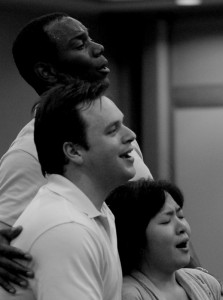There’s a spoiler coming, but if you read these rambling blog posts, you probably want all of the facts anyway. Proceed at your own risk.
 Amid the dehumanizing and frightening world of her captivity, Zaide sees Gomatz, and her immediate love for him gives her new hope. When Gomatz finds her, he is instantly drawn to her, and the two young people find love in the unlikeliest of places.
Amid the dehumanizing and frightening world of her captivity, Zaide sees Gomatz, and her immediate love for him gives her new hope. When Gomatz finds her, he is instantly drawn to her, and the two young people find love in the unlikeliest of places.
They enlist the help of a sympathetic and brave overseer, and all three escape. Unfortunately, they are recaptured and face death upon their return. Only then is it discovered (and this eventuality is incorporated into some of the ending choices* for our production) that the three are actually family. Blood relatives.
Although a taboo subject in our culture, incest isn’t exactly unknown in theatre and myth. Opera has its Siegmund and Sieglinde, and mythology has an endless parade of brothers, sisters, husbands and wives. Is this plot twist in Zaide too much to take? Too far-fetched? Too creepy-crawly?
Mistaken identities and sudden family discoveries are common in opera (think about Mozart’s Figaro learning that Marcellina and Bartolo are his parents) – almost so much that the moment of discovery near the end of Zaide is a dangerous one in the theatre. Will nervous laughter greet the revelation, no matter how it’s delivered? Are we really meant to believe that this is possible? And even if it is, does the 21st-century American “eww” factor kick in so quickly that we can’t get past it?
I’m hardly qualified to delve into this topic, but I am left with one overriding gut reaction to seeing this story played out again and again in rehearsal. If Zaide and Gomatz are siblings separated in childhood, is it so surprising that upon seeing one another in captivity, they would make an immediate and palpable connection? And that as young adults/teenagers, they would immediately translate that connection into romantic love? Family is a complicated thing, and love is a spectrum. What these two young people would do with this knowledge if they were to escape from slavery is unknown and somewhat unfathomable.
Mozart stopped writing at the point where this dilemma would’ve been addressed. We’ll never know if he meant to tackle it or sidestep it. One of the endings we’ve chosen to offer for Zaide allows the family a brief chance to grapple with it before the curtain falls. If you take this journey with us and are in the theatre when that ending is chosen, you’ll probably wrestle with it longer than that.
*On June 11, 13, 15 & 19, each Zaide audience will have the chance to choose from among three possible endings for this fascinating but unfinished Mozart opera.
Add Comment